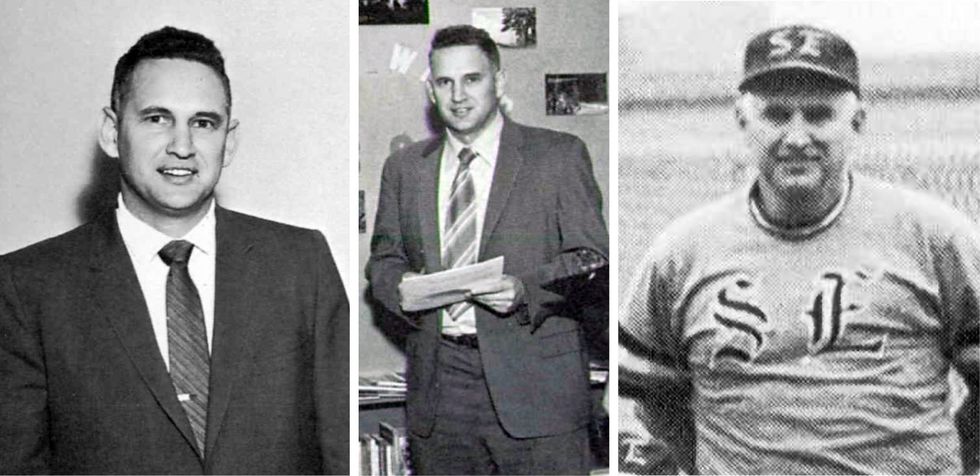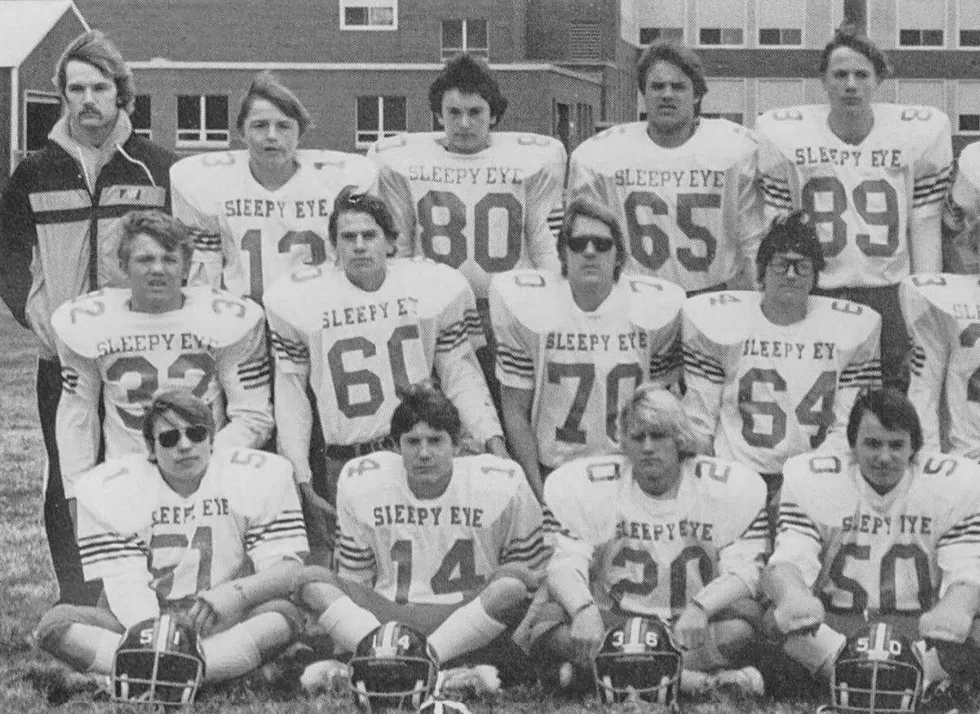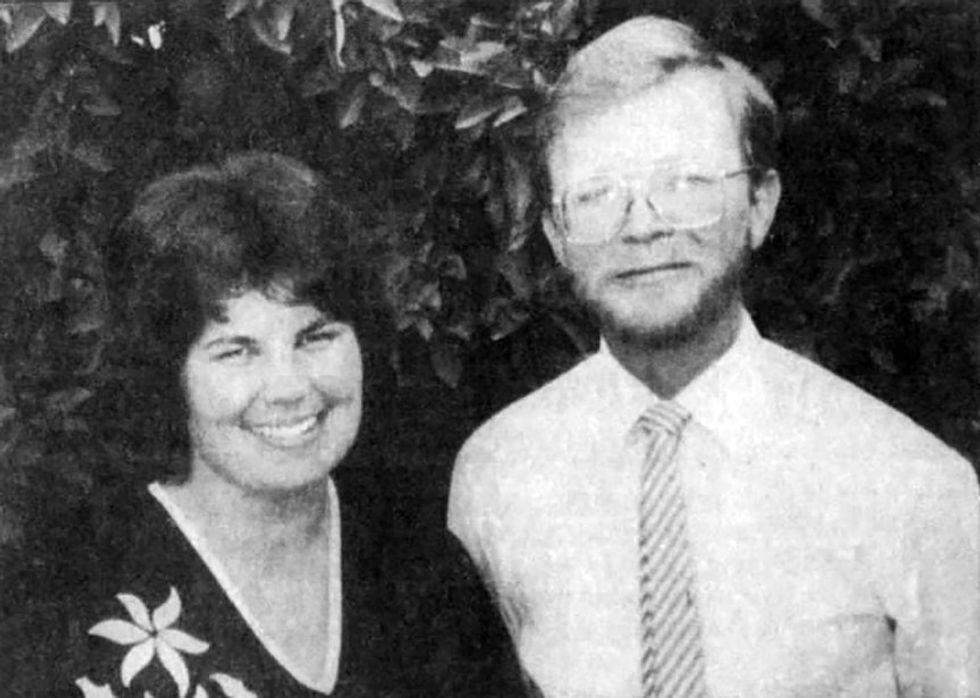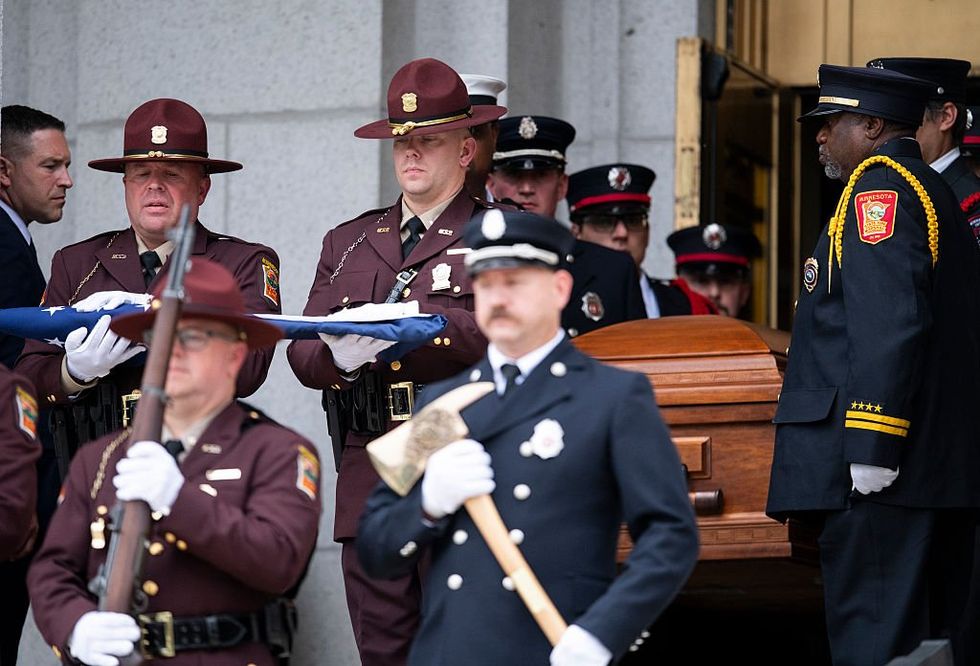
Facebook/FBI/Getty/Sleepy Eye High School

Vance Luther Boelter has little in his pedigree to suggest he might turn from a joyful Christian preacher into a calculating, brutal killer.
Vance Luther Boelter has a habit of not finishing what he started.
Whether it was entrepreneurial business plans, charity proposals, or planned religious endeavors, Boelter’s life is littered with unfinished business.
It’s not that he wasn’t intelligent, wasn't productive, or didn’t accomplish good things. But as often as not, Boelter didn’t complete the things he started.
The predawn hours of June 14, 2025, may have changed all that.
That’s when, according to the FBI, he coldly carried out a terrifying and deadly plan to murder four Minnesota Democrat politicians in the safety of their suburban Minneapolis homes.
That mission, he allegedly completed: two dead, two grievously wounded, and a state left reeling in shock.
Boelter will forever be linked to the masked suspect in the fake police uniform who police say inflicted sheer terror on the Upper Midwest.
Vance Boelter found God at the Del Monte vegetable factory.
Ever since Boelter — according to the FBI — forced his way into the Brooklyn Park home of Minnesota House Speaker Emerita Melissa Hortman and assassinated her, her husband, Mark, and the family golden retriever, the public has tried to make some sense of the ghastly crime.
Surely there must have been hints along the way, across the decades, that a 58-year-old married father of five might somehow be capable of politically motivated, cold-blooded murder.
As he reportedly put it in a text to his wife and children less than three hours after the murders, “Dad went to war last night.”
What war?
Boelter’s personal life, employment history, and professed Christian beliefs don’t yield easy suspects, obvious motives, or pat explanations for that statement or Boelter’s alleged actions.
Sitting in isolation at the Sherburne County Jail in Elk River, Minn., Boelter is charged with state and federal felonies that could bring the death penalty. On Aug. 7 he pleaded not guilty to six federal charges including stalking, murder, attempted murder, and firearms violations.
His life is under a microscope. Yet he remains an enigma.
This despite breathless efforts from both sides of a bitter partisan divide to blame the other for the radicalization of this nondenominational Christian preacher into an alleged avenging angel or modern domestic terrorist. One minute he’s the MAGA Madman Killer, while another he’s the latest deranged leftist who apparently turned violent. Is it one or the other — or neither?
For his part, Boelter has spun grandiose tales since the FBI said he gunned down the Hortmans, shot state Sen. John Hoffman and his wife, Yvette, 17 times, and attempted to gun down daughter Hope Hoffman. Prosecutors said Boelter sought to kill two other lawmakers on June 14.
Boelter blamed Democrat Gov. Tim Walz, claiming the failed 2024 vice presidential candidate ordered him to commit murders as part of a scheme to free up a U.S. Senate seat. But the two current occupants of those seats were not Boelter’s alleged prospective victims on June 14.
Boelter told national news media he had been on a two-year undercover investigation of 400 unusual Minnesota deaths and had probed the connection of state politicians to communist China. He offered no substantiation or other details. Then, on Aug. 6, he told Alpha News that his intention was never to shoot anyone but rather make citizen’s arrests for the deaths occurring from COVID-19 shots.
Is that delusion talking? Or a desperate gambit to avoid the gallows?
Acting U.S. Attorney Joseph H. Thompson doesn’t buy Boelter’s daydreams, chalking them up to a man trying to justify his brutal crimes.
Before the largest manhunt in Minnesota history brought him to justice, Boelter’s worst offenses were speeding tickets, failure to pay for parking, violating overnight parking regulations, and failure to have his children wear life jackets on a boat he was operating.
RELATED: Accused Minnesota assassin: ‘If you want to save the country you have to get your hands dirty’

Boelter’s history includes several failed business ventures. In the years leading up to the assassinations, he abandoned career-track employment to work for two funeral homes, hauling bodies to the morgue or the mortuary.
He worked for the University of Minnesota eye bank, removing eyeballs from the dead to be used as tissue samples. His last day on that job was June 13, one day before the shootings.
He studied mortuary science at an Iowa community college.
From his youth onward, Boelter described himself as someone with something missing from his life — even though he came from a good middle-class Lutheran home in a quiet southern Minnesota town.
“I was raised in a church since I was the smallest child,” Boelter told an African mission gathering in September 2021. “I believed in the Bible. I believed in God. I tried to live a moral life. I didn’t drink, didn’t smoke, didn’t swear, didn’t cuss.
“I respected my parents. But there was something missing when I was a young man,” Boelter said.
‘There became a fire in my heart to live for God.’
Boelter was born on July 23, 1967, in Sleepy Eye, Minn., the youngest of six children of the late Donald LuVerne Boelter and the former Yvonne Strate. An older sister, Dawn Kate Boelter, died in infancy more than five years before Vance was born.
The city of 3,400 souls is named for Chief Sleepy Eye, onetime head of the Sisseton Dakota tribe. Chief Sleepy Eye was a signatory to the Treaty of Traverse de Sioux on July 23, 1851, which ceded 24 million acres of land to the U.S. government and paved the way for Minnesota statehood.
The chief’s name in his native tongue, “Ish-Tak-Ha-Ba,” adorns a monument in town and often appears in the high school yearbook, “The Big Chief.” His name came from his reportedly droopy, lazy eyelids. He died in 1860.
Don Boelter was native to New Ulm, Minn., a standout high school and college athlete who went on to a hall of fame coaching career at Sleepy Eye High School in Brown County, Minn. He set a standard of excellence for himself as a baseball coach and an award-winning social studies and history teacher.
The Boelter family has deep pioneer roots in Southern Minnesota that stretch back 170 years. Don’s father, Emil George Ludwig Boelter, operated a well-known road-construction business from New Ulm.
Emil’s father, Adolph Gustave Boelter, was a farmer in Sibley County, where Vance and his wife bought a $520,000 home in 2023.
The family patriarch, Johann Gottlieb Bölter, emigrated from Kuźniczka, an ethnic German Pomeranian village that is now part of Poland. He and his wife, the former Wilhelmine Noak, arrived in New York on Oct. 15, 1855, aboard the Barque Copernicus. He was listed on the ship register as an arbeiter, or laborer. His destination read “Minysoty,” or Minnesota.
RELATED: ‘The face of evil’: What do we know about accused assassin Vance Luther Boelter?

John Boelter and Wilhelmine brought their toddler and an infant on the journey to America. Their family eventually grew to 14 children, who helped their parents farm in the towns of Henderson and Bismark in Sibley County.
More than 125 years removed from the days of his forebears, Vance Boelter was active in extracurricular school activities, just as his older siblings had been. He sang in the school chorus in junior high and high school. He played on the Sleepy Eye eighth-grade boys' basketball team, wearing jersey No. 52. He played junior high baseball.
In 1981, the year before Vance enrolled for freshman year at Sleepy Eye High School, his father coached the school’s varsity baseball team to a Class A Minnesota state championship with a 20-3 record.
Coach Don Boelter won nine conference titles, was runner-up for six more, and had 309 career wins and a .620 winning percentage as a head baseball coach — most of them at Sleepy Eye. In 2009, he was voted into the Minnesota High School Baseball Coaches Association Hall of Fame.
Being a standout athlete active at school was simply the Boelter way.
Vance’s older brother, Tarry Boelter, was a baseball standout for Sleepy Eye High in the early 1970s. Nicknamed “Belt,” he played on three conference championship teams for the Sleepy Eye Indians. At the University of Minnesota in 1977, Tarry hit a home run that helped lift the Gophers over Iowa to win the Big Ten championship.
One of Tarry’s teammates at Minnesota was the future National Baseball Hall of Fame shortstop Paul Molitor, who played for the Milwaukee Brewers, Toronto Blue Jays, and Minnesota Twins. Tarry played a few seasons of minor league ball for the Twins.
RELATED: Accused assassin clarifies that President Trump, pro-life views did not motivate shootings

Like his father, Tarry made a career of coaching and teaching. He racked up 350 varsity baseball wins at Murray County Central High School on his way to a 2013 induction into the Minnesota high school coaches' hall of fame. The local ball field in Slayton, Minn., is named in his honor.
Being a standout athlete active at school was simply the Boelter way. It left some very big shoes to fill for the youngest Boelter, Vance.
When his father was inducted into the coaches’ hall of fame in 2009, an article published by the New Ulm Sports Central website listed all of the Boelter children and a brief description of their current vocation.
“The Don Boelters had five children including Diane, teaching Sleepy Eye St. Mary’s, Torry, teaching Head Start [in] Sleepy Eye, Tarry, coaching and teaching [in] Slayton, Vawn, teaching in Utah, and Vance, Sleepy Eye,” the article said.
That was his biographical summary: “Vance, Sleepy Eye.”
Vawn Boelter, five years older than Vance, accumulated an impressive list of school achievements splashed on the pages of “The Big Chief” yearbook in her senior year, 1980-81. She played basketball and volleyball, ran track, was in twirling corps, was cheerleader captain her senior year, was homecoming royalty in 1980, and was student council president in 1980-81.
‘When the reality of that hit me, I wept and I cried.’
While his school resume didn’t match his siblings, Vance embraced athletics, playing varsity baseball for his father’s Sleepy Eye Indians. Vance wore jersey No. 80 on the varsity football team.
During summer vacations, he worked at the Del Monte vegetable canning and packing factory — a major employer in Sleepy Eye from the late 1920s until 2019. The factory canned sweet corn and peas grown by hundreds of area farmers on more than 20,000 acres of prime farmland.
Vance Boelter found God at the Del Monte vegetable factory.
At least he found God in a new way that would have a major influence on him as he entered adulthood.
“I was 17 at that time. I worked with a man who talked about God all the time,” Boelter said years later. “I would talk about God once in a while. Or if I found myself in a difficult situation, I would pray. But this guy talked about God all the time.”
RELATED: Accused assassin makes ‘disgusting’ attempt to paint himself a victim over jail conditions: Sheriff

Every time Boelter went to work, he tried to make sure he was close enough to his older friend so he could hear his stories. “I would ask him questions about God, about faith, about things in the Bible,” Boelter said.
The man’s zeal had an influence on the teen, who started devotedly reading the Bible. “I read it in the morning before I went to work,” Boelter said. “I took it to work, and at break I’d read the Bible. I’d get home, and I’d read the Bible after work. There was this stirring in my heart.”
One day the factory shut down for an hour due to a mechanical failure. All of the workers were sent away and suddenly had a free hour. Boelter wondered what his new friend was going to do, since he lived in another town.
“So I asked him, ‘What are you going to do for this hour? We can’t work.’ He said, ‘There’s a lake not far. I’m going to go there, and I’m going to pray and then I’ll be back.’
“And I started thinking, ‘What would you talk to God for an hour about?’ I saw that he had a relationship with God I didn’t have.”
This Christian stirring wasn’t initially an inspiration to Boelter. The young man, not even old enough to drink, suddenly sized up his life and found it severely wanting. Instead of finding joy and motivation, however, Boelter hammered himself for perceived failings. “Just who are you living for?” he asked himself.
‘Forgive me, God, for living for myself and not for you.’
“I looked at my life, and the answer to that question was, ‘I’m living for me. I’m not living for God,’” Boelter said. “And when the reality of that hit me, I wept and I cried. I cried and I cried and I cried. I never cried so hard in my life.”
Boelter’s emotional reaction to his re-energized belief in God seems unusual for a boy of 17 whose family members were regular churchgoers.
Was it an early sign of an impossible standard Boelter established for himself but could never live up to? Would it play out as an impulse to judgment, which he may have later concluded had to be meted out to correct a morally decaying society?
“I cried and I got on my knees and I prayed to God. I remembered everything I heard in the church services growing up, and I thought of everything Jesus did for me,” Boelter recalled. “And I said, ‘I’m so sorry. Forgive me, God, for living for myself and not for you.’”
In recounting his awakening and conversion story, Boelter then told a 2021 audience of Congolese Lutherans something that sounded powerful at the time but echoes hollow after his alleged involvement in the events of June 14.
“Jesus, if you forgive me my sin and save me, I’ll live for you for the rest of my life,” Boelter said. “And the presence of God came in that room, and I knew I was right with God.
“He changed that selfish person into a person who cared about other people first,” Boelter said. “And that encounter with God is just like it happened yesterday, and there became a fire in my heart to live for God.”
Another early experience with religious zeal deeply affected Boelter. While he attended St. Cloud State University, he befriended a devout Christian, David Thomas Emerson of Osakis, Minn., who was studying Arabic.
Emerson was, as his father described him, an “unusual person” who dropped out of the University of Minnesota-Duluth and for a time lived the life of a hobo. Emerson lived in a tepee in the woods near his Todd County hometown, trying to scrape out a living tapping maple trees for sap.
Then he joined a Pentecostal group that was planning a trip to Zimbabwe to dig wells for the poor and preach the gospel. After two years of missionary work in Zimbabwe, Emerson’s visa expired, and he returned to Minnesota and took classes at St. Cloud State. He told Boelter about his work and his plan to return to Zimbabwe in June 1987.
RELATED: Accused assassin clarifies that President Trump, pro-life views did not motivate shootings

Emerson, 34, wrote to Boelter from Africa, sharing the details of his missionary work. After Emerson went back to Zimbabwe under a visitor visa, things were not going well. Local anti-government rebels didn’t want white, Western Pentecostal missionaries in the country. Boelter said they accused his friend of being a communist.
On November 25, 1987, a group of rebels armed with machetes attacked the occupants of Olive Tree Farm and New Adam Farm in Umzingwane. They hacked 16 people to death, including Emerson and his Zimbabwean fiancée, Penelope Sarah Lovett, 28. Before escaping into the bush, the rebels burned down the farm buildings.
Emerson and Lovett had been planning a December 1987 wedding.
Boelter later said he held no animus toward the Marxist rebels who murdered his friend and 15 others.
“I knew if those people that did that horrible thing, if those people that killed them, if they had known Jesus, they wouldn’t have done that,” Boelter said. “So I felt compassion for those people.”
Boelter later named his only son David Emerson Boelter in honor of his friend. The couple’s daughters are named Grace, Faith, Hope, and Joy.
Boelter decided he wanted to share his newly discovered relationship with Christ, so he wrote out his testimony and published 10,000 copies in brochure format, which he handed out to anyone who would listen.
After finishing a bachelor's degree in international relations at St. Cloud State University, Boelter moved south to enroll in classes at Dallas-based Christ for the Nations Institute, a charismatic interdenominational Bible college. It was founded in 1970 by James Gordon Lindsay, a Pentecostal revivalist minister.
Boelter earned a practical theology diploma from CFNI between 1988 and 1990. He later earned a master's degree in management and a doctorate in leadership from Cardinal Stritch University in Milwaukee.
Shortly after, Boelter began what would be a three-decade career in food production, packaging, and fulfillment. He spent a short time in the early 1990s delivering frozen foods to residential customers for Schwan’s Home Service, a subsidiary of Schwan’s Company of Marshall, Minn.
He went to work at the Gold’n Plump Chicken Cold Spring Processing Plant in Cold Spring, Minn. His name appeared in a full-page ad in the Sept. 11, 1994, issue of the St. Cloud Times. Gold’n Plump congratulated its employees for the plant winning the Campbell Soup Select Supplier Award.
In mid-1997, Boelter became engaged to Jennifer Lynne Doskocil of Washburn County in Wisconsin’s North Woods. At the time, he was living in Arcadia, Wis. The couple were married on October 4, 1997, in Winona, Minn.
Jenny, as she is known to family and friends, graduated from Spooner High School in 1992. She was the 1991 prom queen, played on the girls’ golf team, was in the Science and Math Club, was a member of the Gifted and Talented Program, and was secretary of the Drama Club.
RELATED: Vance Boelter’s wife speaks out for first time since June 14 shooting rampage

Boelter supported his growing family with employment at a series of food production and processing companies over the next two decades. Employers included Gerber Products Company, Johnsonville Sausage, Del Monte Foods, Lettieri’s, and 7-Eleven. Boelter switched employers in 2000, 2004, 2008, 2011, 2016, and 2021.
A resume Boelter provided to a headhunter and obtained by journalist Ken Klippenstein is missing some employers that Boelter has touted in his business dealings, including Marathon Speedway, Northern Tier Energy, Western Refining, Andeavor, and Tesoro. Boelter told a business colleague that he ran a small food-processing plant for Andeavor to supply some of its 3,000 convenience store locations.
Boelter used this expanded list of companies in promotional copy developed for his Red Lion Group website, a copy of which was obtained by Blaze Media.
Western Refining acquired Northern Tier Energy in 2016. Northern Tier operated an oil refinery in St. Paul Park, Minn. Marathon Petroleum Corp. bought rival Andeavor in a $23 billion deal in 2018. Andeavor was previously known as Tesoro Corp.
Marathon Petroleum Corp. sold off its 3,800 Speedway locations to 7-Eleven Inc. in a deal finalized in May 2021. Boelter’s resume says he worked for 7-Eleven as an operations manager from April 2016 to November 2021. He told a Minnesota newspaper in December 2018 that he worked for Marathon Petroleum.

The job changes brought with them frequent moves. According to real estate records, over two decades the Boelters lived in Arcadia, Wis.; Eau Claire, Wis.; Fort Smith, Ark.; Muldrow, Okla.; Sheboygan, Wis.; Sleepy Eye, Minn.; Shakopee, Minn.; Inver Grove Heights, Minn.; Gaylord, Minn.; and Green Isle, Minn.
While Boelter wasn’t adept at long-term employment, he and his wife had a knack for turning profits on the homes and other properties they bought, according to deeds and lending records. In March 2022, the Boelters sold one Minnesota home for $300,000 more than what they paid for it in late 2016. In 2016, they doubled their money when selling their home in Shakopee, Minn., chalking up a $155,000 profit.
The equity they built over the years no doubt helped them purchase their Green Isle home for $520,000 in October 2023. The four-bedroom, 3,868-square-foot home set on 11 acres has a current estimated market value of $570,900, according to the real estate website Zillow. It appears the Boelters paid cash, since there is no lien against the property to secure a mortgage.
Boelter was named to the Minnesota Governor’s Workforce Development Council in 2016 by Democrat Gov. Mark Dayton. Democrat Gov. Walz appointed Boelter to a similar post that ran from December 2019 to January 2023.
Boelter was a member of the Dakota-Scott Workforce Investment Board from 2013 until 2023, “part of the team that went to Washington D.C. in 2015, 2017, 2019, 2021, and 2023,” according to his resume.
Seemingly inspired by the New Apostolic Reformation popularized at Christ for the Nations Institute, Boelter founded a nonprofit organization called Revoformation Ministries Inc.
Boelter formed Revoformation as a non-stock Wisconsin corporation on April 12, 2006. The corporation’s Wisconsin registration became delinquent in April 2011 and was dissolved by the Wisconsin Department of Financial Institutions August 2012, state records show.

Revoformation Ministries was approved as a nonprofit organization in 2007. It filed annual tax returns with the IRS for most years through 2023.
Vance Boelter applied for a registered service mark for the term “Revoformation” from the United States Patent and Trademark Office in 2015. It was approved in May 2017, but canceled by the USPTO in November 2023 because Boelter failed to file a declaration of use within six years of approval.
A book Boelter was writing in 2006 called “Original Ability” was promoted on his Revoformation.com website. The book “presents a different paradigm on the nature of man and our relationship with God.” Boelter said "original ability" is the “single most important factor in successfully explaining the Gospel.” It appears the book was never published.

The New Apostolic Reformation includes the belief that “an age of revival began around 1900, during which essentials that the Church lost or suppressed long ago were gradually ‘revived’ or ‘restored,’” according to Father Thomas Buffer, a priest writing in the Catholic Times.
Restorationist Pentecostals have been influenced by “Word of Faith” teachers “who taught the authority of the believer to ‘command’ evil spirits and sickness,” Buffer wrote. Under “dominion theology,” Christians believe they have been given authority over all creation, he said.
“This would later be combined with the ‘mandate’ to take over the ‘seven mountains’ of family, religion, education, media, arts and entertainment, business, and government,” Father Buffer said.

The term “New Apostolic Reformation” was coined by the late Charles Peter Wagner in the 1990s. According to one January 2025 article, NAR is considered a “radical evangelical movement.”
“Unlike traditional conservative evangelicalism, which often seeks to uphold the status quo, the NAR promotes the establishment of ‘God’s Kingdom on Earth’ by dismantling secular governance,” wrote Abigail James in “The Rise of the New Apostolic Reformation.”
In speeches on his mission trips to the Democratic Republic of the Congo, Boelter lamented the lack of unity among Christians and what he said was the American church’s failure to uphold crucial teachings.
“Many churches in America didn't listen to Jesus. They're divided,” Boelter said in February 2023. “This little group here, this little group here, this little group here, and the enemy, the devil, comes through and rips everything apart!"
“The churches are so messed up!” Boelter said. “They don’t know abortion is wrong, many churches. They don’t have the gifts flowing. God gives the body gifts to keep balance.”
“America’s in a bad place,” Boelter said. “Jesus didn’t suggest being one body. He commanded it. The American church didn’t listen to Jesus.”

In a statement that comes straight from NAR teachings, Boelter said God would raise up members of the faithful to fix the vexing problems.
“God is going to raise up apostles and prophets in America to correct his church, and those that are connected to the body, they will come through this mess and they will be strong again, and once again, they’ll send missionaries out and be a blessing.”
The Boelters purchased four commercial properties in Wisconsin and Iowa between 2007 and 2020, possibly intended for use by Revoformation Ministries, but didn’t end up developing them, records showed. They sold the last of those properties in July 2024.
The buildings included a former church in Pierson, Iowa, an office building in Radisson, Wis., a former school in Brillion, Wis., and a 23-unit rooming house in Park Falls, Wis.
The Boelters’ ownership of the former Iowa church raised the suspicions of neighbors.
The Boelters purchased the two-story brick structure at 230 Summit St. for $20,000 in November 2020. One neighbor told the Sioux City Journal she saw a spotlight on the building around midnight one night as “the occupants” painted the four large white pillars on the building front. A woman who lives across the street said she observed “a lot of riffraff” around the building during the years the Boelters owned it.
In 2021, the Boelters established another tax-exempt charity, You Give Them Something to Eat Inc., based on Christ’s admonition to his disciples to feed the crowds before He performed the miracle of the loaves and fishes. The charity did not report any income or expenses in 2022 or 2023. The IRS nonprofit organization database does not show a tax return filed for 2024.
Vance and Jenny Boelter appear to have made a serious run at launching a security company called Praetorian Guard Security Services LLC, starting in 2018.
It was the second time in 20 years they tried to establish a security company. The first iteration, known as Souljer Security LLC, was registered with the State of Wisconsin on Nov. 15, 1999. By October 2005, the LLC registration was delinquent. Notices sent to Vance Boelter were returned as undeliverable in 2009 and 2010. That led to a dissolution order from the Wisconsin Department of Financial Institutions.

Praetorian Guard was founded in Minnesota on Sept. 12, 2018. Jenny Boelter was the president and Vance was director of security patrols, according to a now-defunct version of the company website accessed on the Wayback Machine. The LLC registration lapsed in early 2022, was reinstated 18 months later, lapsed again in January 2025, and was reinstated on Jan. 29, 2025.
The company invested heavily in vehicles and equipment, including the 2015 Ford Explorer Police Interceptor SUV Boelter allegedly drove to the Hortman home to carry out the assassinations on June 14.
According to vehicle registration records reviewed by Blaze Media, the Boelters purchased the 2015 Ford Explorer on May 14, 2019. The vehicle was originally owned by the Osceola Police Department in Polk County, Wis.
The Boelters purchased two other Ford Explorer Police Interceptor SUVs, model years 2018 and 2013. Those were originally operated by the Jackson County Sheriff’s Office in Black River Falls, Wis., and the Lakeville Police Department in Dakota County, Minn.
In December 2014, the Boelters purchased a 2011 Ford Crown Victoria Police Interceptor sedan originally owned by the St. Louis Park Police Department in Hennepin County, Minn., records show. The Boelters disposed of that vehicle in September 2017.
Ford has manufactured and marketed specially outfitted vehicles for law enforcement since the 1950s. The Police Interceptor line was introduced in 1992. The 2025 model has advanced sensors, such as a perimeter alert that rolls up windows and locks the doors if it senses an approaching threat.
‘God is going to raise up apostles and prophets in America to correct his church.’
Praetorian Guard Security never landed any clients or became fully operational, in part because of the COVID-19 pandemic, according to a 2023 letter Jenny Boelter wrote to the Minnesota Private Detective and Protective Agents Board, which licenses security companies.
“She said the pandemic hit the company hard in 2020, noting her family had already invested thousands of dollars by buying vehicles, signs, firearms, uniforms, and other gear, but failed to qualify for any pandemic-related assistance,” read a June 27 article in the Minnesota Star Tribune.
Boelter’s biggest proposed business venture was the Red Lion Group, a company he founded to improve life in the Congo River Basin. Red Lion will be the subject of a forthcoming Blaze Media report.
Given his intense planning, several trips to the DRC, and the extensive expenses involved, abandoning the Red Lion Group was perhaps Boelter’s most crushing defeat. He made his final trip to the DRC in spring 2025 and returned to Minnesota dejected and facing financial troubles, according to his hometown friend, David Carlson.
Like Blaze News? Bypass the censors, sign up for our newsletters, and get stories like this direct to your inbox. Sign up here!